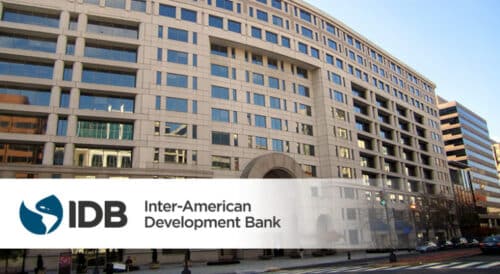On November 8, 2021, 30 civil society organizations – including many Coalition members – addressed a letter to the Inter-American Development Bank (IDB), expressing their concerns in regard to the process to review the second IDB Group-Civil Society Action Plan (2022-2024). Below, you can find the text of the letter:

Dear Mr. Claver-Carone,
As civil society organizations who have engaged for years with the Inter-American Development Bank (IDB), actively engaged in the safeguards review, and supported the creation of the MICIs, we are writing to convey concerns in regard to the process to review the second IDB Group-Civil Society Action Plan (2022-2024).
While we celebrate the fact that the IDB plans to review the Action Plan to strengthen its relationship with civil society and project-affected communities, we urge the IDB to use this as an opportunity to open space for civil society and project-affected people more broadly, recognizing the important role they play in guaranteeing that IDB Group-sponsored development benefits and does not harm people and the environment. In that vein, we also want to request a meeting with you and your team, to discuss how the IDB can foster an institutional culture whereby the organization is more receptive to interaction with and input from civil society and project affected communities.
We believe that the way the review for the second IDB Group-Civil Society Action Plan (2022-2024) is being structured –sending invitations one week or 10 days before the dialogue is happening, inviting a limited number of civil society organizations that participated in the safeguards review process, and very structured agendas—inhibits civil society engagement in the process.
Based on widely shared experiences from our previous engagement with the IDB Group, we believe that IDB Group engagement with civil society and affected communities has been and continues to be worryingly weak compared to other peer institutions. The lack of civil society participation in IDB Group Annual Meetings represents just one example.
To make the IDB Group Action Plan review process and future implementation more open and accountable, we urge you and your team to consider the following recommendations:
● Meet with Civil Society at the IDB Annual Meetings in Punta del Este, Uruguay 2022. Provide specific opportunities and space for civil society to participate and effectively engage in the Annual Meetings of the Board of Governors of the IDB and IDB Invest, to be held in 2022 in Punta del Este, Uruguay, as well as in future meetings and events.
● Send invitations for dialogues and consultations in advance and ensure diversity and accessibility. Guarantee a minimum of 30 days’ notice prior to each dialogue. Use public announcements and proactive timely outreach by country offices, to make the consultation process accessible in all IDBG-member countries, including beyond country capitals.
● Outreach must include critical civil society, indigenous peoples and other local organizations, and people affected by IDBG projects (including MICI requesters).
● Provide stakeholders with the information they need to participate in a meaningful way. Provide all necessary background information and publish documents a minimum of 30 days prior to the dialogue. Make documents available in relevant member country languages.
● Seek input from stakeholders to facilitate their participation. Create agendas that are detailed, participatory, and shared in advance. Sharing the agenda in advance provides opportunities for civil society to shape the discussion while also preparing questions on the content. Also, extensive PowerPoint presentations and highly structured ‘dialogues’ with consultants hired by the IDB to moderate the discussion, reduce space for meaningful discussion directly with the Bank specialists and thus lead to less productive input.
● Develop a plan for ongoing communication with stakeholders after the consultation or dialogue. The IDB should be ready to provide feedback on how stakeholder input influenced decisions and reasoning behind why some input may, or may not, have been incorporated.
We appreciate your consideration and look forward to working with IDB Management to strengthen IDB Group’s relationship with civil society and project-affected people. We believe this could be an important opportunity to continue promoting the cultural shift that allows for more transparency and accountability at the bank.
Signatories
AIDA- Asociación Interamericana para la Defensa del Ambiente (Regional)
Alianza de Derecho Ambiental y Agua (Guatemala)
AMATE- Asociación Centro de Estudios de la Diversidad Sexual y Genérica (El Salvador)
Asociación Ambiente y Sociedad (Colombia)
Asociación Indigena y Campesina ch’orti’ Nuevo Día (Guatemala)
Asociación Unión de Talleres 11 de Septiembre (Bolivia)
Bank Information Center (United States)
CALPI- Centro de Asistencia Legal a Pueblos Indígenas (Nicaragua)
Center for International Environmental Law (CIEL, Global)
Coalition for Human Rights in Development (Global)
Conectas Direitos Humanos (Brazil)
Derecho, Ambiente y Recursos Naturales (Peru)
ECOA- Ecologia e Ação (Brazil)
FONASC – Fórum Nacional da Sociedade Civil nos Comitês de Bacias Hidrográficas (Brazil)
Fundación Ambiente y Recursos Naturales (Argentina)
Fundación Cambio Democrático (Argentina)
Fundación CAUCE: Cultura Ambiental – Causa Ecologista (Argentina)
Fundación Para la Conservación y el Uso Sustentable de los Humedales (Argentina)
Fundeps- Fundación para el Desarrollo de Políticas Sustentables (Argentina)
Inesc- Instituto de Estudos Socioeconômicos (Brazil)
International Accountability Project (Global)
International Rivers (Brazil)
Nomogaia (United States)
Oxfam (Global)
Plataforma Internacional Contra la Impunidad (Switzerland)
Protección Internacional Mesoamérica (Regional)
Red de Organizaciones de Managua (Nicaragua)
Rede Pantanal (Brazil)
SODIS- Sociedad y Discapacidad (Peru)
Sustentarse (Chile)
